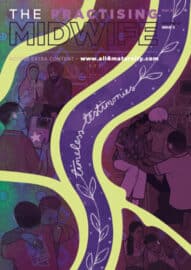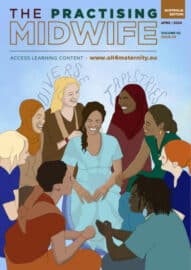What is the Impact of Forced Displacement on Maternity Care?
Esther Sharma – Doctoral Researcher, London School of Hygiene and Tropical Medicine
Twitter: @maternalmatters
Introduction
 With the world’s eyes on Ukraine, and images of hundreds of thousands of Ukrainians having to leave their homes so violently, this blog post explores the impact of forcible displacement of women, particularly those who are pregnant, give birth or have newborns while experiencing displacement.
With the world’s eyes on Ukraine, and images of hundreds of thousands of Ukrainians having to leave their homes so violently, this blog post explores the impact of forcible displacement of women, particularly those who are pregnant, give birth or have newborns while experiencing displacement.
Forced displacement or forced migration, is defined by the IOM as “a migratory movement which, although the drivers can be diverse, involves force, compulsion, or coercion.”. Whilst this definition is contentious, as it implies that individuals have no agency in their movement which we know not to be true, it does also convey the sense of rupture that people who are forcibly displaced experience, whether due to conflict, natural disaster, persecution, climate change or a raft of other factors which may result in a person felling their home. The focus on this piece will be displacement due to armed conflict. Forced displacement may be internal or across borders; over 80 million people have had to flee their homes to escape conflict since 2010. We can often perceive forced displacement to be an emergency situation, however it is estimated that over three-quarters of people who are forcibly displaced, are displaced for more than five years, resulting in very protracted situations of displacement.
Attacks on health systems are commonplace in conflict settings
Women who are forcibly displaced and who experience pregnancy, birth or transition to parenthood, whether for the first or subsequent time, face particular challenges. Attacks on health systems are commonplace in conflict settings – facilities themselves have been bombed or looted, health professionals have been intimidated or attacked and basic medical supplies made unavailable. Maternity services are no exception to this. In 2020, a maternity hospital in Kabul was attacked, killing 24 women who were admitted at the time. Medical facilities in Syria have been actively targeted, including a maternity and children’s hospital which was bombed in 2019.
physical separation from family and social networks remove women from sources of social support
Living conditions greatly impact displaced women. There can be difficulties in accessing adequate nutrition to support pregnancy or lactation, conditions can be lacking in hygiene and sanitation and the availability of material needs such as newborn clothing and nappies can be limited. In addition, physical separation from family and social networks remove women from sources of social support which we know to play a significant role in pregnancy, birth and adjusting to life with a newborn. There can be a lack of personal space and privacy in temporary accommodation and separation from male members of the household can put women and children at greater risk of sexual violence.
women who are forcibly displaced are more likely to experience poor maternal mental health
Many women will have witnessed traumatising events and lost loved ones. The loss, for women who are pregnant or recently given birth, of having to uproot from all which represents home and safety cannot be underestimated. Unsurprisingly then, evidence shows that women who are forcibly displaced are more likely to experience poor maternal mental health. That said, women are not purely passive victims of their circumstances, but in my own preliminary research among refugee women, I am finding that women form new ways of enacting their resourcefulness in the ever-changing situations in which they find themselves.
The provision of international protection is designed to provide sanctuary to those who are forcibly displaced. Currently the UK government is in the process of introducing the Borders Bill which aims to discourage people from entering the UK to seek asylum through irregular means, including Channel crossings, but without making provisions for those in need of protection to enter the UK through regular means. The majority of those who enter the UK via dangerous Channel crossings are deemed to be genuinely in need of international protection. This exclusionary policy which further enacts the “hostile environment” of the UK goes against the 1951 Refugee Convention, will force those who want to seek asylum in the UK to take increasingly dangerous routes to do so, exposing themselves and their family to greater risks.
As midwives in the UK, it’s likely that at some stage we will find ourselves supporting a woman who has experienced forcible displacement. Whilst Ukraine is at the forefront of our minds at the moment, it is important to remember that there are women from other conflict zones who are also displaced in Europe (some in fact who had arrived in Ukraine to seek sanctuary and now face a double-displacement). Some of the key things we can do are to:
- Always use a professional interpreter to facilitate communication;
- Signpost women to local sources of social support to assist women develop social networks;
- Be watchful of mental health and refer promptly to perinatal mental health services if necessary;
- Avoid asking women to re-tell their stories if it is not necessary, to avoid re-traumatisation;
- Above all, be kind, compassionate and respectful.

Useful links:
Support for Asylum Seekers in the UK – City of Sanctuary
https://swindon.cityofsanctary.org/campaigns/ukraine
Maternity stream: https://maternity.cityofsanctuary.org
Maternity Action – Migrant Women’s Rights Service https://maternityaction.org.uk/migrant-womens-rights-service/
Refugee Council – information for asylum seeking pregnant women and new mothers https://www.refugeecouncil.org.uk/information/resources/asylum-support-policy-and-practice-in-relation-to-pregnant-women-and-new-mothers/
Working or volunteering as a midwife in refugee contexts abroad
Indigo Volunteers – https://www.indigovolunteers.org/volunteer-needs
Medecins Sans Frontieres – https://www.msf.org/work-msf








